Buoyant force Study guides, Class notes & Summaries
Looking for the best study guides, study notes and summaries about Buoyant force? On this page you'll find 305 study documents about Buoyant force.
All 305 results
Sort by
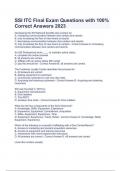 Popular
Popular
-
SSI ITC Final Exam Questions with 100% Correct Answers 2023.
- Exam (elaborations) • 73 pages • 2023
-
- $12.99
- 1x sold
- + learn more
SSI ITC Final Exam Questions with 100% Correct Answers 2023. Developing the SSI Network benefits dive centers by: A. increasing communication between dive centers and resorts B. only increasing the flow of new divers to resorts C. decreasing communication between dive centers and resorts D. only increasing the flow of new divers to centers - Correct Answer-A. increasing communication between dive centers and resorts An SSI Professional must ____ to maintain active status. A. complete the...
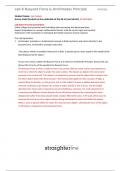
-
PHY250L Lab 8 Buoyant Force & Archimedes Principle Straighterline FALL 2023
- Other • 17 pages • 2024
- Available in package deal
-
- $24.49
- + learn more
Pre-Lab Questions 1. Archimedes' principle is a fundamental concept in fluid mechanics and relates directly to the buoyant force. Archimedes' principle states that: "Any object, wholly or partially immersed in a fluid, is buoyed up by a force equal to the weight of the fluid displaced by the object." In your own words, explain the Buoyant Force as it relates to Archimedes Principle. Ensure that you discuss this in terms of the equation for Buoyant Force. The Buoyant Force is when an o...

-
PADI, Open Water Diver, Final Exam Review
- Exam (elaborations) • 24 pages • 2024
-
- $13.49
- + learn more
D float. Salt water is heavier than fresh water because it has dissolved minerals in it. This means it causes more upward force (buoyancy) on an object. An object that is neutrally buoyant in fresh water would float in salt water because there is greater upward force. See Being a Diver I - Buoyancy and Controlling Buoyancy. - Answer-1) If an object is neutrally buoyant (does not sink or float) in fresh water, the same object placed into salt water would A sink. B either sink or float....
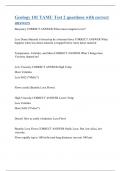
-
Geology 101 TAMU Test 2 questions with correct answers
- Exam (elaborations) • 23 pages • 2023
- Available in package deal
-
- $15.49
- + learn more
Buoyancy CORRECT ANSWER What causes magma to rise? Less Dense Material is forced up by a buoyant force CORRECT ANSWER What happens when less dense material is trapped below more dense material Temperature, Volatiles, and Silica CORRECT ANSWER What 3 things does Viscosity depend on? Low Viscosity CORRECT ANSWER High Temp More Volatiles Less SiO2 (*Mafic*) Flows easily (Basaltic Lava Flows) High Viscosity CORRECT ANSWER Lower Temp Less Volatiles More SiO2 (*Felsic*) Doesn't ...

-
PADI, Open Water Diver, Final Exam Review Questions And Answers
- Exam (elaborations) • 20 pages • 2024
- Available in package deal
-
- $13.99
- + learn more
PADI, Open Water Diver, Final Exam Review Questions And Answers D float. Salt water is heavier than fresh water because it has dissolved minerals in it. This means it causes more upward force (buoyancy) on an object. An object that is neutrally buoyant in fresh water would float in salt water because there is greater upward force. See Being a Diver I - Buoyancy and Controlling Buoyancy. - ANS 1) If an object is neutrally buoyant (does not sink or float) in fresh water, the same obj...
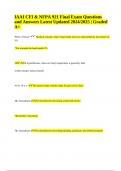
-
IAAI CFI & NFPA 921 Final Exam Questions and Answers Latest Updated 2024/2025 | Graded A+
- Exam (elaborations) • 41 pages • 2024
- Available in package deal
-
- $14.99
- + learn more
IAAI CFI & NFPA 921 Final Exam Questions and Answers Latest Updated 2024/2025 | Graded A+. Rule of Nines" Medical concept, where major body areas are represented by increments of 9% *For example the head equals 9% 109F In hyperthermia, what core body temperature is generally fatal within minutes unless treated? 4.0 to 10 w.c. The typical water column range for gas service lines 4th Amendment The amendment concerning search and seizure *Remember "knocking" 5th Amendment The amendment ...

-
PADI, Open Water Diver, Final Exam Review.Well Solved By Expert LatestUpdated 2024.Top Ranked Solution
- Exam (elaborations) • 26 pages • 2024
-
- $9.49
- + learn more
D float. Salt water is heavier than fresh water because it has dissolved minerals in it. This means it causes more upward force (buoyancy) on an object. An object that is neutrally buoyant in fresh water would float in salt water because there is greater upward force. ,,, See Being a Diver I - Buoyancy and Controlling Buoyancy. - answers>1) If an object is neutrally buoyant (does not sink or float) in fresh water, the same object placed into salt water would A sink. B either sink or fl...

-
PADI, Open Water Diver, Final Exam Review with 100% Correct Answers 2023
- Exam (elaborations) • 25 pages • 2023
-
- $12.99
- + learn more
Salt water is heavier than fresh water because it has dissolved minerals in it. This means it causes more upward force (buoyancy) on an object. An object that is neutrally buoyant in fresh water would float in salt water because there is greater upward force.

-
PADI, Open Water Diver, Final Exam Review
- Exam (elaborations) • 19 pages • 2023
-
- $12.49
- + learn more
D float. Salt water is heavier than fresh water because it has dissolved minerals in it. This means it causes more upward force (buoyancy) on an object. An object that is neutrally buoyant in fresh water would float in salt water because there is greater upward force. See Being a Diver I - Buoyancy and Controlling Buoyancy. - Answer- 1) If an object is neutrally buoyant (does not sink or float) in fresh water, the same object placed into salt water would A sink. B either sink or float...
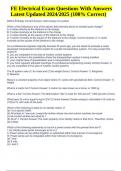
-
FE Electrical Exam Questions With Answers Latest Updated 2024/2025 (100% Verified)
- Exam (elaborations) • 47 pages • 2024
-
- $17.49
- + learn more
FE Electrical Exam Questions With Answers Latest Updated 2024/2025 (100% Verified) As a professional engineer originally licensed 30 years ago, you are asked to evaluate a newly developed computerized control system for a public transportation system. You may accept this project if: A. you are competent in the area of modern control systems B. you do not live in the jurisdiction where the transportation system is being installed C. your original area of specialization was in transportation ...



